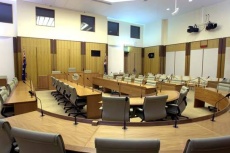The Senate is hearing presentations from media industry leaders this week about Senator Conroy’s proposed media reform legislation.
Communications Minister Conroy is proposing a range of mostly newspaper related reforms, which are being strenuously resisted by companies such as News Limited. See our Hot off the Net page for clippings on this topic.
While it is mainly a side show as far as the radio industry is concerned, there are three significant elements in the debates for radio.
If one aspect of the legislation is enacted, it could lift cross-media ownership restrictions, and allow Southern Cross Austereo to merge with Channel Nine.
The focus on regional areas may also allow mention to be made of the expansion of digital radio to regional areas – see our other story on CRA’s campaign.
And the debates may also give a platform to supporters of the community digital radio funding campaign to push their requests for more digital transmission funding.
Click to view the live proceedings of the Joint Select Committee on Broadcasting Legislation here (when in session).
To view Question Time, where this is expected to generate heated debate, and other proceedings, click here for the Senate and here for the House of Reps.
The parliament is considering legislation to abolish the 75% reach rule, which prohibits TV broadcasters from broadcasting to more than 75% of the population. What makes it timely at the moment is the possibility of a Channel Nine takeover bid for SCA, worth about $4 billion.
It is also a battle for what News Limited characterises as a press freedom issue, while the government says it is about preventing media abuses, such as those perpetrated by the News Limited phone hacking scandals in the UK.
With the tight time frame of a week for the parliament to consider Senator Conroy’s legislation, and much bigger fish to fry, such as leadership speculation, as the Labor Party approaches a federal election in September, the debate and vote on this legislation is likely to be no more than an interesting side show with very little achieved.
Whatever the outcome, it is likely that the focus on SCA in this week’s coverage will give it a strengthened negotiating position when it comes to renegotiating tv broadcast deals with channel ten.
Nine CEO David Gyngell gave undertakings of quality news retention to the Senate committee today: “I wouldn’t allow the 75 per cent rule to be removed without the certainty that you’re going to receive the high quality of local news content you receive now. We have a high degree of respect for what Win does and what Prime does in the local community, and if I was in any of your positions I would never advocate to have that removed and if it was removed, you’d have to put an enforceable undertaking to ensure that you continue to receive it. And that’s the undertaking that we have given you there.”
Seven Network chairman Kerry Stokes did not have a view on the 75% reach rule, but does question the speed of the process: “Channel Nine is owned by two American hedge funds. It’s a little bit different, it’s not an Australian company, it’s not governed on the stock exchange if it’s traded. It’s two American hedge funds own Nine and I can promise from experience of dealing with them, they don’t have much interest in Australia other than making a profit.
“They’re proposing a deal with Southern Cross, which is owned by Macquarie Bank. I’m not going to comment on Macquarie Bank, I’m sure you all have your own opinions of what their motivations are. We’re not for or against this rule staying, we think probably there’s good reason for it to go eventually but there needs to be circumstances surrounding it that we understand.”
News Limited CEO Kim Williams told parliament: “We believe that the News Media (Self-regulation) Bill seriously breaches the implied constitutional freedom of political communication. It will undermine freedom of communication about government or political matters.”
The proposed PIMA (public interest media advocate), which is appointed by, and beholden to, Government, is “fundamentally inconsistent with a free press” said Williams. “The PIMA’s powers are so vast that companies will have to seek its approval for internal restructures even if they don’t cause a change in a number of voices. This is a modern-day star chamber – no more, no less.”
Williams said the Australian Competition and Consumer Commission, the Australian Communications and Media Authority and the Foreign Investment Review Board already have “extensive powers to enforce diversity and ensure competition.”

